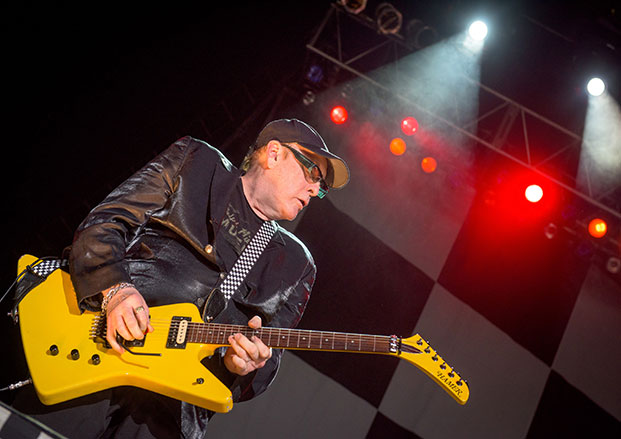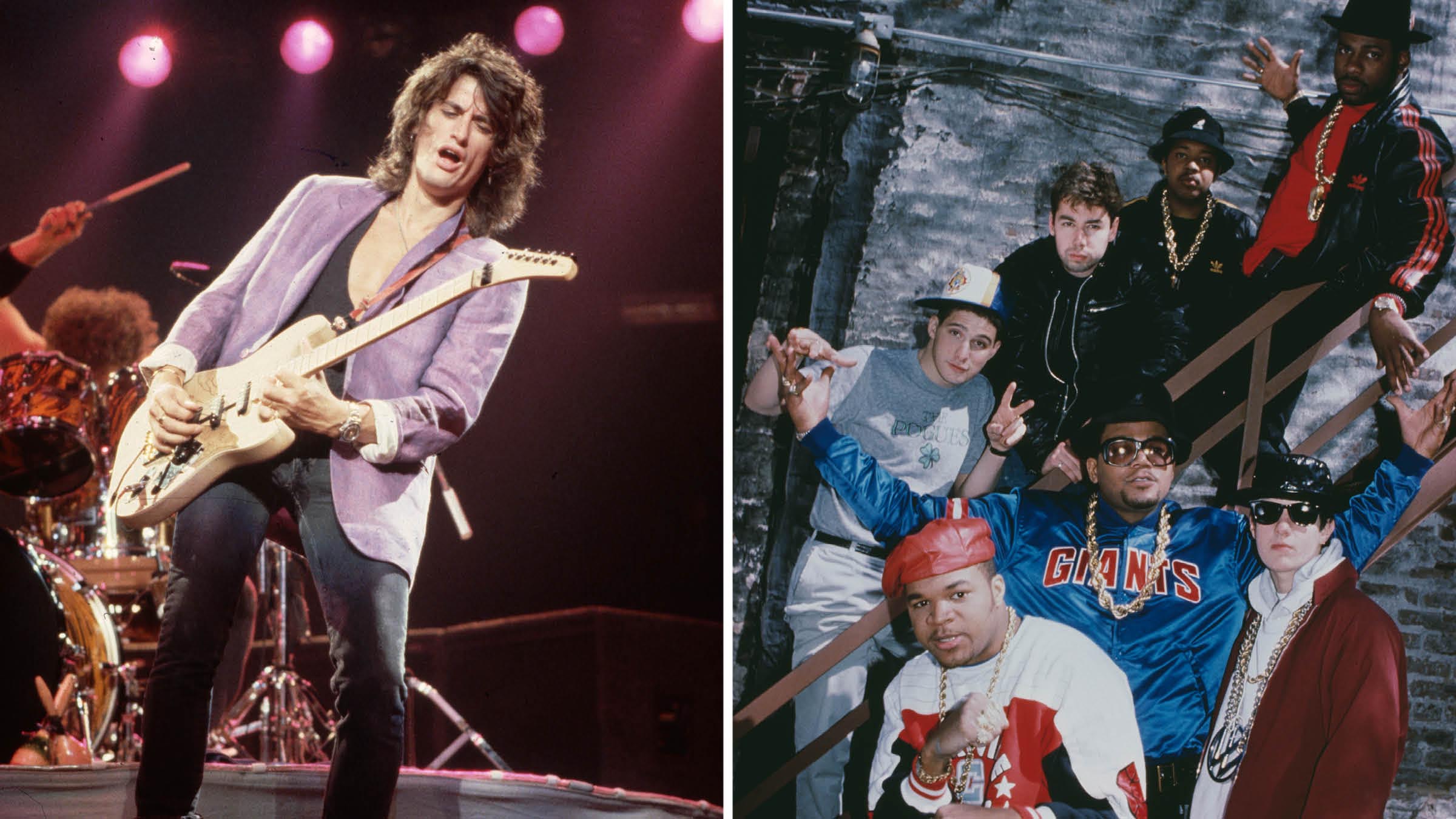Rick Nielsen Discusses His Favorite Guitarists, Gear and Pursuing His Dreams
All the latest guitar news, interviews, lessons, reviews, deals and more, direct to your inbox!
You are now subscribed
Your newsletter sign-up was successful

This 2016 Rock and Roll Hall of Fame inductee has penned such timeless classic-rock hits as “I Want You to Want Me” and “Surrender” and owns more guitars than you or almost anybody else.
But what Guitar World readers really want to know is…
Who are your top three favorite guitar players of all time? — Jason Morris
I love Pete Townshend and I’m still knocked out whenever I hear Jimi Hendrix, but Jeff Beck is definitely Number 1 and has been ever since I heard the Yardbirds back when I was a kid.
Everything he did was unexpected and cool...like, “God, I wish I could play like that.” He wasn’t as structured as other players were and wasn’t soloing like Duane Eddy or Chet Atkins or that kind of stuff; he simply did things that no one else would ever think of or dare to do. Also, he would play for the song, so when a solo came in, it never took away from anything. It was another musical highlight.
With Pete Townshend, I just love everything he does as well. His lead playing on the Who’s Live at Leeds is phenomenal. In 1979, we were on a bill at the Open Air Rock Festival in Nuremburg, Germany, with AC/DC and the Scorpions that the Who were headlining. Townshend walked up to me backstage and asked me, “Rick, how did you get that great guitar sound on “I Want You to Want Me” on the At Budokan album?” I was like, “What? You made Live at Leeds!” It was so funny, just like, what question would Pete Townshend never ask you if he ever actually talked to you.
You throw picks into the audience continually during your shows, and at the end of the set you throw out an album cover with picks taped to all the edges as well. Have you ever injured anyone or have you developed a technique to avoid that? — Tyson Scanlon
All the latest guitar news, interviews, lessons, reviews, deals and more, direct to your inbox!
As far as the picks are concerned, I think that people like to be injured by me! [laughs] But we’ve never had anyone complain that I put their eye out or anything. Once in a while though, people in the audience get a little roughed up scrambling and fighting for the stuff I toss out—which is one of the reasons I keep throwing stuff, so people know there’s more coming and won’t fight over it. As far as the record covers, a few people have been hit pretty good with those, but luckily we don’t have the actual vinyl in the sleeves, so that helps.
Do you ever talk to Jon Brandt or Pete Comita, the two bass players who replaced Tom Petersson when he left the band from 1980 to 1987? — Kim Sanders
Pete Comita I never hear from, but I see Jon Brandt about once a year—he’s such a good guy. He’s got a thriving horse ranch and horse bedding business here in Illinois with his wife and I think he also still plays once in a while. So he’s doing just fine.
I saw you guys play recently and your sound was killer. What amps do you use in your live rig? — Adam Tuzzio
There are about three amps that are running full time. Backstage, I have a Randall Isolation box speaker that is powered by my Fender Deluxe Reverb that was modified by Paul Rivera of Rivera Amplification. That sound gets sent to the front of house as well as into my in-ear monitors. Then the other amps will be a rotating combination of other things. I recently had all of my vintage amps restored and am using them live again. I had them on the road until about 1981 and then they went into our warehouse where they were basically gathering dust and getting rusty. There’s a bunch of different colored Marshall heads and bottoms, some Selmers, and the Orange 80-watt 2x12 combo that I used to record almost the entire first Cheap Trick album back in 1976. I bought that amp at Cliff Cooper’s Orange Music store when I was in London in 1968 or 1969, right after he had started building his own amps.
Most people think of Cheap Trick as a happy “power pop” band, but a lot of your earlier songs like “Auf Wiedersehen,” “Oh Candy,” and even “He’s a Whore” touch on really dark subject matter. Why did you move away from material like that on later records? — Paul Wilms
I do what I do and I’m not trying to please everyone. What we do was never unidirectional or about one topic. In fact, when we were making our first record, I asked Tom Petersson our bass player whether he thought that I should use songwriting aliases because the songs all sounded so different that people wouldn’t get me as a songwriter. I just wanted to write about stuff that was happening in real life and that’s not just love songs about your girlfriend.
If you could play only one of your guitars for the rest of your life, which one would it be? — Kurt Warnick
For live, I would say my original Hamer Standard, which is shaped like a Gibson Explorer. That shape really captures what my personality is and it just feels good to me. In the studio, though, my first choice is usually my 1959 Gibson Les Paul. That’s always a good starting point.
You had a family before Cheap Trick got signed. Was it hard to hold on to your dream with all of the financial and time pressures? Was your wife okay with your choice to keep being in band even if it wasn’t the “responsible” thing to do? I ask because mine isn’t! — Paul Ellis
Well, my wife is complicated like anybody but she’s very understanding and she knew what she wanted in life and I knew what I wanted in life, and it’s nice that we’re together doing that. She always wanted to have a family whereas I’m an only child so I grew up not knowing what it was like to have brothers and sisters around, but I wanted to play music and she allowed me to do that and I loved her enough where we ended up having kids and a life and we’re still together…do you want me to get her? I think she’s in the other room. [Walks away from the phone for several seconds]. Alright, Tom, here’s my lovely wife Karen!
KAREN NIELSEN: Hello?
GUITAR WORLD: Hi Karen! We were just asking Rick a question from one of our readers about whether you were okay with him being in a band.
KAREN NIELSEN: I don’t think that when you love somebody it’s a choice. The only way for a couple to be happy together is when you’re both happy individually with what you’re doing, I wanted to stay home and have kids and he wanted to be a musician and be on the road. And we had four kids so I followed my dreams and he was on the road so he followed his.
Do you feel like hell the morning after a show? I ache just watching you run around the stage all night. — Danny LaRuso
I actually usually feel pretty good afterward and I really enjoy the workout—it’s like my aerobics lesson for the day. The only time I have a problem is when I have to get in a vehicle after we play and sit there in a cramped position for a couple of hours to drive to the next place. Then I get super stiff.
What’s the best piece of advice you were ever given by another famous musician?—John Lawrence
Hmmmm. I can’t really think of anything off the top of my head, but I can tell you what advice I give people: Have a good work ethic. You’ve got to practice, practice, practice. I’m not telling you what to practice—that’s up to you. I took one guitar lesson, and they wanted me to play “Mary Had a Little Lamb” or “Michael Row the Boat Ashore,” and that was the last guitar lesson that I ever took, so I taught myself what I wanted to know.
There have always been better players than me and there have always been better songwriters than me, but I was never trying to act like or think that I was the best there is. But I like the idea, I like the process, I like what I do, and I never wanted to be anybody else. You’ve got to play like you mean it and play what you like.
